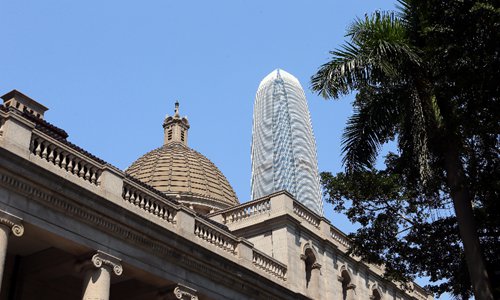
Hong Kong Court of Final Appeal (Front) and International Finance Center are seen in Hong Kong, south China, March 2, 2017. (Xinhua/Li Peng)
The Court of Final Appeal in the Hong Kong Special Administrative Region (HKSAR) on Tuesday dismissed the appeal of a former university student who had pleaded guilty to violating the National Security Law (NSL) for Hong Kong, which experts noted was an "instructive, authoritative, and binding" ruling that upholds the spirit of the rule of law.Lui Sai-yu, who was a student from Hong Kong Polytechnic University, was sentenced to five years in prison in April 2022 by the district court in the HKSAR after being accused of "inciting others to commit secession." Lui didn't accept the decision and asked for an appeal. On November 30, 2022, the High Court of the HKSAR dismissed the appeal and upheld the sentence.
The district court in HKSAR had decided that the starting point for Lui's prison term should be five years and six months, then six months were deducted to reflect his guilty plea, RTHK reported on Tuesday.
Normally a defendant who admits to his or her crimes receive a one-third reduction, but the six-month reduction was the maximum allowed under the NSL for Hong Kong, which specifies that those who commit a serious secession offense shall be required to serve a sentence of at least five years, but no more than 10 years, said the report.
During Tuesday's judgment, the judges refuted the appellant's argument that a five-year prison sentence should have been the starting point for sentencing - which would allow for actual sentences to be below the threshold, according to the report.
This case is of special significance in determining the legislative intent of the NSL for Hong Kong regarding the establishment of a mandatory minimum sentence. In fact, the appellate dispute of the case is whether the five-year minimum sentence for "serious cases" is a "sentencing guideline" or the "final sentence," Louis Chen, a member of the Election Committee and general secretary of the Hong Kong Legal Exchange Foundation, told the Global Times on Tuesday.
Article 33 of the NSL for Hong Kong clearly states that provisions related to lighter or reduced punishments do not include pleas of guilt; thus, defendants should not receive reduced sentences. Taking the crime of murder, which requires a mandatory life sentence, as an example, it emphasizes that mandatory punishments truly reflect the severity of the crime. The sentencing mechanism of the NSL for Hong Kong should prioritize deterrence, and not all mitigating factors apply, Chen said.
Willy Fu, a law professor and vice-chairman of the Hong Kong Legal Exchange Foundation, also welcomed and supported the ruling made by the court.
Fu pointed out that the NSL for Hong Kong is a national law and therefore holds a paramount position. The law needs to be coherent, compatible, and complementary with local laws. However, when inconsistencies arise between the NSL for Hong Kong and the local laws of the HKSAR, Article 62 of the NSL for Hong Kong should be given priority.
This principle also applies to the interpretation of sentencing provisions in the NSL for Hong Kong. Therefore, local sentencing laws and principles fully function within the sentencing framework set by the law.
In the judgment released on Tuesday, the Court of Final Appeal in the HKSAR also correctly noted that "[local] sentencing laws must therefore operate in tandem with the NSL to achieve the aim of safeguarding national security, giving priority to NSL provisions in case of inconsistency."
The law aims to prevent, stop, and punish crimes endangering national security. It should adhere to the rule of law, respect and safeguard human rights, combat the very small number of criminals endangering national security, protect the legitimate rights and interests of the majority of citizens, maintain HKSAR's prosperity and stability, and ensure the steady and far-reaching practice of One Country, Two Systems, Fu said.
The court's ruling on the mandatory sentencing guidelines for the crime of secession under the NSL for Hong Kong, specifically regarding cases of "serious circumstances," which require a prison sentence of five to 10 years, clearly indicates that mandatory punishments reflect the severity of the crime.
"This ruling is instructive, authoritative, and binding, upholding the spirit of the rule of law. Its significance is profound and deserves the support of the general public," Fu said.



